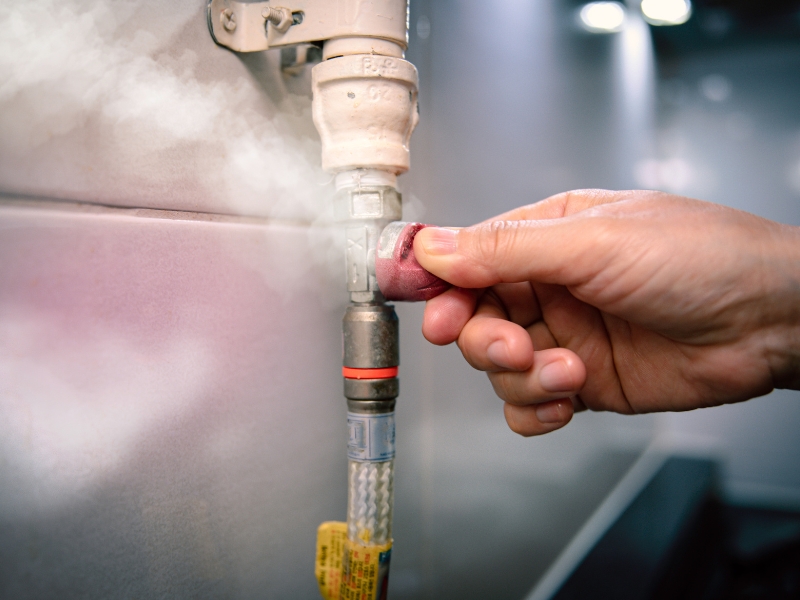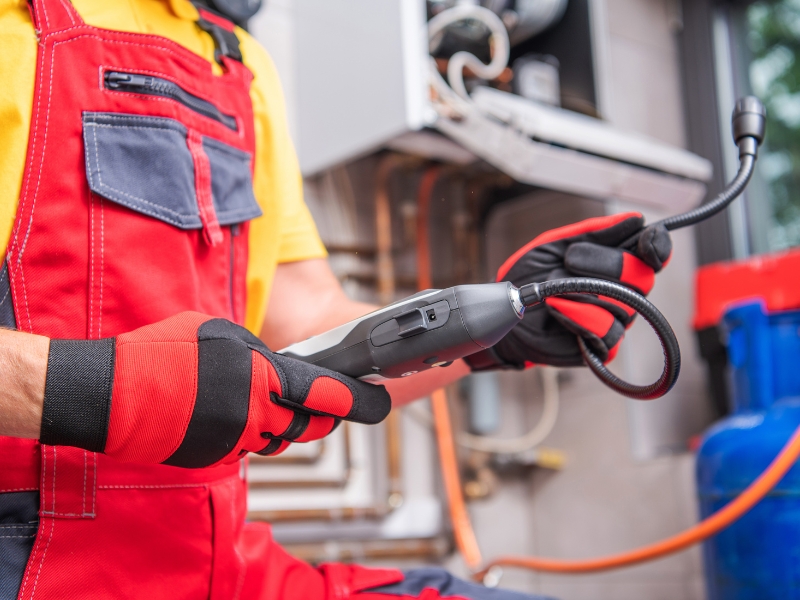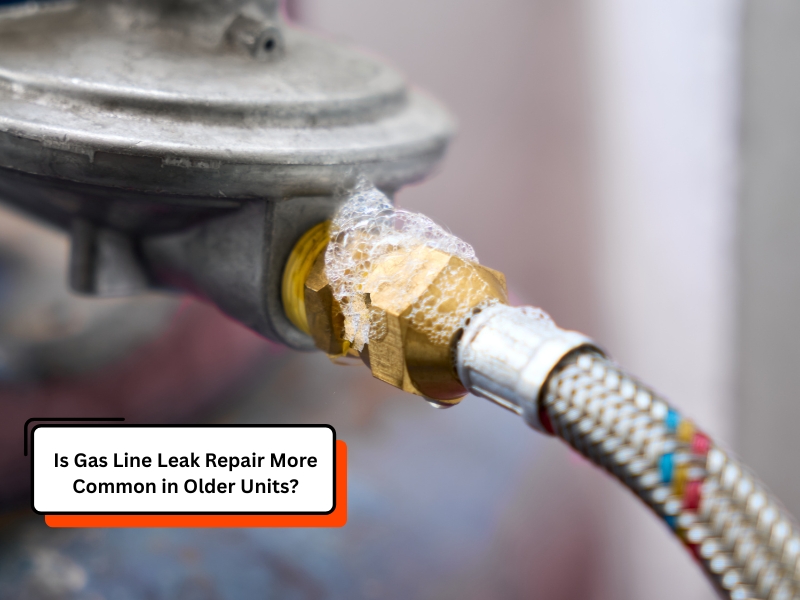Gas line leaks are a serious concern in any home or business, especially in older properties. Over time, pipes and fittings can deteriorate, leading to gas leaks that pose significant risks. Whether natural gas or LPG, a gas line leak is a safety issue that should never be ignored. For residential and commercial owners across Sydney, Australia, it’s crucial to understand how gas line leaks work and why older units are particularly susceptible. This article explores the factors that make older gas lines more vulnerable to leaks, how to identify a gas leak, and what steps to take if you suspect one.
What is a gas line leak?
A gas line leak occurs when a hole or crack in a pipe carries gas from your gas supply to your appliances. This leakage can allow gas to escape your home, potentially leading to dangerous situations such as fires, explosions, or poisoning. Gas leaks are often silent, invisible, and undetectable without proper tools, making it critical to take preventive measures and have gas lines inspected regularly. Here are the common signs of a gas line leak:
- Smell of gas: The most obvious sign of a gas leak is the unmistakable rotten egg smell added to natural gas for detection.
- Hissing sound: A faint hissing near gas pipes or appliances may indicate a leak.
- Dead plants: Gas escaping into the soil may kill plants near the leak.
- Bubbling water: If gas is leaking underground, it may cause bubbles in standing water.
A gas line leak is dangerous and needs immediate attention. If you suspect a gas leak, don’t hesitate to call a professional for a thorough inspection.
Why are older units more prone to gas line leaks?
Older gas lines, especially those made of outdated materials, are more prone to developing leaks. Over the years, wear and tear from factors like age, corrosion, and environmental conditions can weaken the integrity of the pipes. Older properties often have gas lines made of cast iron or galvanised steel, which are more susceptible to corrosion and cracking than newer materials like copper or flexible stainless steel.
Reasons why older units are more susceptible to gas line leaks:
- Corrosion: Rust and corrosion are common problems in older gas lines, which can weaken the pipes over time.
- Wear and tear: Constant use of gas appliances can cause pipes to degrade, especially in older systems.
- Outdated materials: Older units often use materials that are less durable or resistant to damage than modern alternatives.
- Improper installation: Older gas lines might have been installed incorrectly, which increases the risk of leaks.
Given that older homes often have aging gas lines prone to issues, proactively conducting regular inspections is vital. This highlights the importance of gas leak detection for aging appliances, as these can also develop faults leading to leaks.
When should you suspect a gas line leak in an older property?
If you live in an older property, you must be aware of the signs that may indicate a gas line leak. While not all leaks are immediately apparent, several indicators can help you spot a potential issue. Older homes may show specific symptoms of gas line leaks due to the age and wear of the infrastructure.
When to suspect a gas line leak in an older home:
- Unusual smell: A distinct rotten egg or sulphur-like smell may indicate a gas leak.

- Increase in utility bills: A sudden, unexplained spike in gas bills may point to a leak.
- Physical symptoms: Dizziness, nausea, or headaches can be signs of inhaling gas, a severe health risk.
Due to the factors mentioned earlier, older homes are more likely to experience issues with gas lines, so it’s vital to be proactive with regular inspections.
Is it safe to stay in a home with a gas line leak?
No, staying in a home with a gas line leak is unsafe. Gas leaks are hazardous and pose significant risks to health and safety. Exposure to natural gas can lead to fires, explosions, or carbon monoxide poisoning. If you suspect a gas leak, you should evacuate your home immediately and contact a professional gas fitter or plumber for emergency service.
Potential hazards of gas line leaks:
- Explosion risk: A spark or open flame can ignite leaking gas, causing explosions.
- Carbon monoxide poisoning: Gas leaks can lead to dangerous carbon monoxide build-up, which is odourless and potentially lethal.
- Health risks: Breathing in gas can cause dizziness, headaches, nausea, and, in severe cases, loss of consciousness.
If you notice any signs of a gas leak, such as the smell of gas or physical symptoms, do not ignore them. Always err on the side of caution and contact a licensed technician immediately to assess the situation. This way, understanding the process of fixing a gas line leak can help you make informed decisions and know what to expect when professional help arrives.
Who should you contact if you suspect a gas leak?
If you suspect a gas line leak in your home or business, it’s crucial to contact a licensed gas plumber or technician immediately. Gas leaks are not a DIY repair job and should be addressed by professionals with the necessary tools and experience to ensure safety.
Steps to take if you suspect a gas leak:
- Turn off gas supply: If it’s safe, turn it off at the meter.
- Evacuate the building: Leave your home or building to avoid inhaling potentially harmful gases.
- Call a professional: Contact a licensed gas fitter or plumber to inspect and repair the leak.

- Avoid open flames or electrical devices: Do not turn on light switches or appliances, as they could spark a fire.
Gas line leak detection and repair should only be handled by professionals trained to safely handle hazardous materials. If you suspect a gas leak, don’t wait—seek expert help immediately.
How to prevent and treat gas pipe corrosion
Preventing corrosion in gas pipes is a highly effective way to reduce the likelihood of leaks, particularly in older properties. Regular maintenance and inspections ensure your gas lines’ long-term safety and reliability. Adhering to safety standards for natural gas distribution in Australia is also critical for maintaining the integrity of your gas lines and ensuring the safety of your home or business.
Tips to prevent gas pipe corrosion:
- Regular inspections: Schedule annual inspections by a professional to identify potential issues early on.
- Proper ventilation: Ensure proper ventilation around your gas lines to prevent moisture build-up, which can contribute to corrosion.
- Protective coatings: Some gas pipes can be coated with protective materials to prevent rust and corrosion.
- Replace outdated pipes: If you have old gas pipes, consider replacing them with more durable, corrosion-resistant materials.
By maintaining your gas lines properly, you can significantly extend their lifespan and prevent issues like corrosion that could lead to dangerous gas leaks.
How are gas line leaks detected and repaired in older homes?
Detecting and repairing gas line leaks in older homes requires a thorough inspection by a licensed professional. Several methods are used to detect gas leaks, including advanced technology such as gas leak detectors and pressure testing. Once a leak is detected, it can be repaired using various methods, depending on the location and severity of the damage.
Common methods for detecting and repairing gas leaks:
- Pressure testing: Technicians may use pressure testing to determine if there’s a drop in pressure, indicating a leak.
- Gas detectors: These handheld devices can detect the presence of gas in the air and pinpoint the location of a leak.
- Pipe replacement or repair: Depending on the extent of the damage, a plumber may either repair the pipe or replace it entirely to ensure safety.
If you live in an older property and suspect a gas line leak, it’s essential to call a professional as soon as possible to ensure the issue is detected and addressed before it becomes a bigger problem.
Conclusion
In older homes, gas line leaks are more common due to factors like age, wear, and outdated materials. If you notice any signs of a gas leak, taking immediate action is vital to protect your property and health. Regular inspections and maintenance are essential in preventing gas line leaks and ensuring the safety of your home or business.
For peace of mind and safe heating, discover how Apex Gas Heater Service can help keep your home safe and comfortable all year round.

